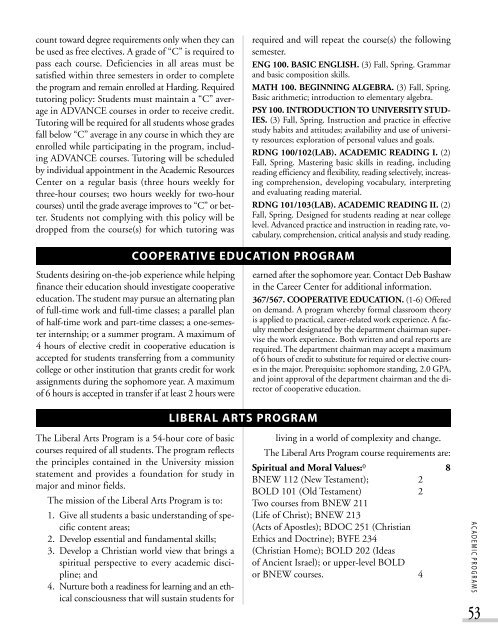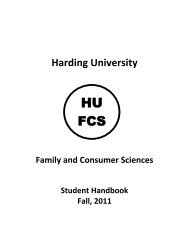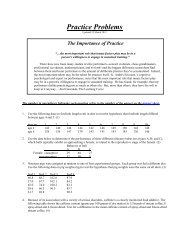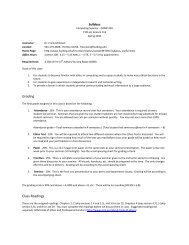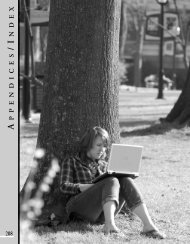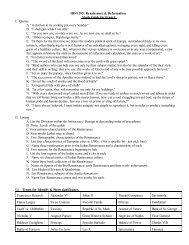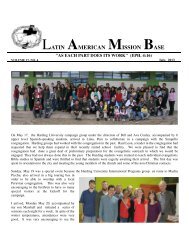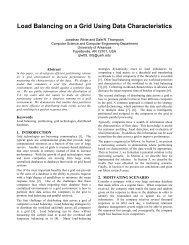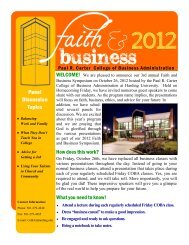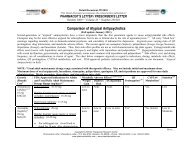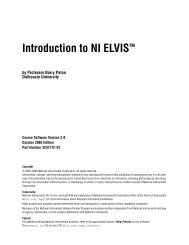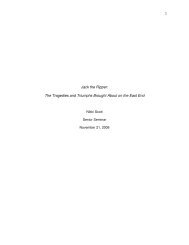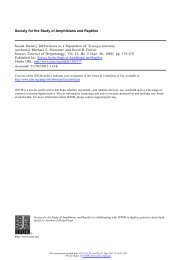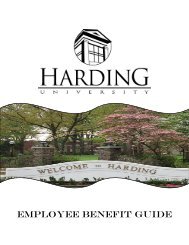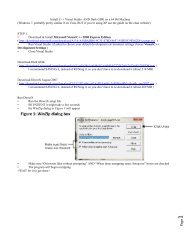51 C A D E M I C R O G R A M S - Harding University
51 C A D E M I C R O G R A M S - Harding University
51 C A D E M I C R O G R A M S - Harding University
Create successful ePaper yourself
Turn your PDF publications into a flip-book with our unique Google optimized e-Paper software.
A C A D E M I C P R O G R A M S<br />
count toward degree requirements only when they can<br />
be used as free electives. A grade of “C” is required to<br />
pass each course. Deficiencies in all areas must be<br />
satisfied within three semesters in order to complete<br />
the program and remain enrolled at <strong>Harding</strong>. Required<br />
tutoring policy: Students must maintain a “C” average<br />
in ADVANCE courses in order to receive credit.<br />
Tutoring will be required for all students whose grades<br />
fall below “C” average in any course in which they are<br />
enrolled while participating in the program, including<br />
ADVANCE courses. Tutoring will be scheduled<br />
by individual appointment in the Academic Resources<br />
Center on a regular basis (three hours weekly for<br />
three-hour courses; two hours weekly for two-hour<br />
courses) until the grade average improves to “C” or better.<br />
Students not complying with this policy will be<br />
dropped from the course(s) for which tutoring was<br />
required and will repeat the course(s) the following<br />
semester.<br />
ENG 100. BASIC ENGLISH. (3) Fall, Spring. Grammar<br />
and basic composition skills.<br />
MATH 100. BEGINNING ALGEBRA. (3) Fall, Spring.<br />
Basic arithmetic; introduction to elementary algebra.<br />
PSY 100. INTRODUCTION TO UNIVERSITY STUD-<br />
IES. (3) Fall, Spring. Instruction and practice in effective<br />
study habits and attitudes; availability and use of university<br />
resources; exploration of personal values and goals.<br />
RDNG 100/102(LAB). ACADEMIC READING I. (2)<br />
Fall, Spring. Mastering basic skills in reading, including<br />
reading efficiency and flexibility, reading selectively, increasing<br />
comprehension, developing vocabulary, interpreting<br />
and evaluating reading material.<br />
RDNG 101/103(LAB). ACADEMIC READING II. (2)<br />
Fall, Spring. Designed for students reading at near college<br />
level. Advanced practice and instruction in reading rate, vocabulary,<br />
comprehension, critical analysis and study reading.<br />
COOPERATIVE EDUCATION PROGRAM<br />
Students desiring on-the-job experience while helping<br />
finance their education should investigate cooperative<br />
education. The student may pursue an alternating plan<br />
of full-time work and full-time classes; a parallel plan<br />
of half-time work and part-time classes; a one-semester<br />
internship; or a summer program. A maximum of<br />
4 hours of elective credit in cooperative education is<br />
accepted for students transferring from a community<br />
college or other institution that grants credit for work<br />
assignments during the sophomore year. A maximum<br />
of 6 hours is accepted in transfer if at least 2 hours were<br />
earned after the sophomore year. Contact Deb Bashaw<br />
in the Career Center for additional information.<br />
367/567. COOPERATIVE EDUCATION. (1-6) Offered<br />
on demand. A program whereby formal classroom theory<br />
is applied to practical, career-related work experience. A faculty<br />
member designated by the department chairman supervise<br />
the work experience. Both written and oral reports are<br />
required. The department chairman may accept a maximum<br />
of 6 hours of credit to substitute for required or elective courses<br />
in the major. Prerequisite: sophomore standing, 2.0 GPA,<br />
and joint approval of the department chairman and the director<br />
of cooperative education.<br />
LIBERAL ARTS PROGRAM<br />
The Liberal Arts Program is a 54-hour core of basic<br />
courses required of all students. The program reflects<br />
the principles contained in the <strong>University</strong> mission<br />
statement and provides a foundation for study in<br />
major and minor fields.<br />
The mission of the Liberal Arts Program is to:<br />
1. Give all students a basic understanding of specific<br />
content areas;<br />
2. Develop essential and fundamental skills;<br />
3. Develop a Christian world view that brings a<br />
spiritual perspective to every academic discipline;<br />
and<br />
4. Nurture both a readiness for learning and an ethical<br />
consciousness that will sustain students for<br />
living in a world of complexity and change.<br />
The Liberal Arts Program course requirements are:<br />
Spiritual and Moral Values: 0 8<br />
BNEW 112 (New Testament); 2<br />
BOLD 101 (Old Testament) 2<br />
Two courses from BNEW 211<br />
(Life of Christ); BNEW 213<br />
(Acts of Apostles); BDOC 2<strong>51</strong> (Christian<br />
Ethics and Doctrine); BYFE 234<br />
(Christian Home); BOLD 202 (Ideas<br />
of Ancient Israel); or upper-level BOLD<br />
or BNEW courses. 4<br />
53


